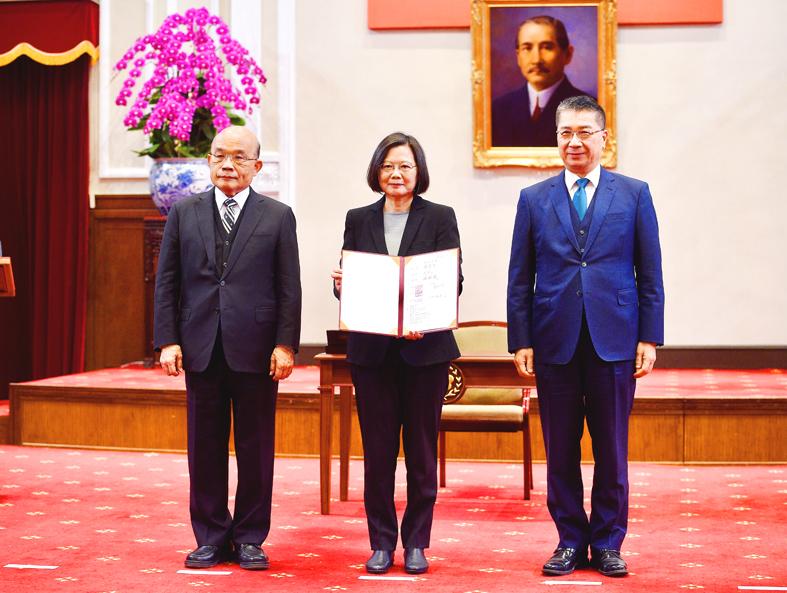President Tsai Ing-wen (蔡英文) yesterday signed into law the Stalking and Harassment Prevention Act (跟蹤騷擾防制法), which increases the punishments for stalking and harassment.
Speaking at a news conference attended by Premier Su Tseng-chang (蘇貞昌), Minister of the Interior Hsu Kuo-yung (徐國勇), and Democratic Progressive Party (DPP) lawmakers Ker Chien-ming (柯建銘), Kuan Bi-ling (管碧玲) and Fan Yun (范雲), Tsai said the act would offer better protection to victims of stalking and harassment.
The act was passed by lawmakers across party lines and is to take effect in six months, she said.

Photo: Peter Lo, Taipei Times
“The act is an important first step toward the prevention of gender-based violence,” Tsai said.
Tsai also highlighted the murder of Peng Wan-ru (彭婉如), a former director of the DPP’s Women’s Affairs Department and feminist advocate, as the day before the promulgation was the 25th anniversary of her death. The case remains unsolved.
Peng’s death increased awareness of the need to protect women, spurring the introduction of dedicated legislation.
“We believe we will do more and better along the way,” Tsai said.
The act, passed by the Legislative Yuan on Nov. 19, defines stalking and harassment as continuous or repeated actions that are related to sex or gender, frighten the victim and have negative effects on their daily lives.
It defines eight types of behavior as stalking or harassment, including spying, trailing, following, approaching, threatening, insulting and harassment over the Internet.
It also covers pursuing a relationship in an inappropriate manner, sending unsolicited messages, video clips or other objects by mail, tarnishing a person’s reputation and using their identity to buy goods.
The act stipulates a prison sentence of up to one year and a fine of up to NT$100,000 for those found guilty of any of those acts.
Perpetrators who additionally carry a dangerous weapon can be sentenced to a maximum of five years in prison and/or a fine of up to NT$500,000.

South Korean K-pop girl group Blackpink are to make Kaohsiung the first stop on their Asia tour when they perform at Kaohsiung National Stadium on Oct. 18 and 19, the event organizer said yesterday. The upcoming performances will also make Blackpink the first girl group ever to perform twice at the stadium. It will be the group’s third visit to Taiwan to stage a concert. The last time Blackpink held a concert in the city was in March 2023. Their first concert in Taiwan was on March 3, 2019, at NTSU Arena (Linkou Arena). The group’s 2022-2023 “Born Pink” tour set a

CPBL players, cheerleaders and officials pose at a news conference in Taipei yesterday announcing the upcoming All-Star Game. This year’s CPBL All-Star Weekend is to be held at the Taipei Dome on July 19 and 20.

The Taiwan High Court yesterday upheld a lower court’s decision that ruled in favor of former president Tsai Ing-wen (蔡英文) regarding the legitimacy of her doctoral degree. The issue surrounding Tsai’s academic credentials was raised by former political talk show host Dennis Peng (彭文正) in a Facebook post in June 2019, when Tsai was seeking re-election. Peng has repeatedly accused Tsai of never completing her doctoral dissertation to get a doctoral degree in law from the London School of Economics and Political Science (LSE) in 1984. He subsequently filed a declaratory action charging that

The Hualien Branch of the High Court today sentenced the main suspect in the 2021 fatal derailment of the Taroko Express to 12 years and six months in jail in the second trial of the suspect for his role in Taiwan’s deadliest train crash. Lee Yi-hsiang (李義祥), the driver of a crane truck that fell onto the tracks and which the the Taiwan Railways Administration's (TRA) train crashed into in an accident that killed 49 people and injured 200, was sentenced to seven years and 10 months in the first trial by the Hualien District Court in 2022. Hoa Van Hao, a